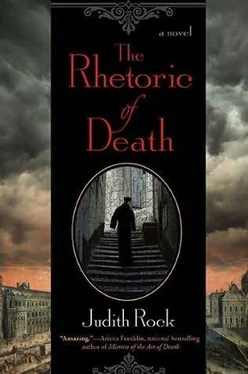Judith Rock - The Rhetoric of Death
Здесь есть возможность читать онлайн «Judith Rock - The Rhetoric of Death» весь текст электронной книги совершенно бесплатно (целиком полную версию без сокращений). В некоторых случаях можно слушать аудио, скачать через торрент в формате fb2 и присутствует краткое содержание. Жанр: Исторический детектив, на английском языке. Описание произведения, (предисловие) а так же отзывы посетителей доступны на портале библиотеки ЛибКат.
- Название:The Rhetoric of Death
- Автор:
- Жанр:
- Год:неизвестен
- ISBN:нет данных
- Рейтинг книги:3 / 5. Голосов: 1
-
Избранное:Добавить в избранное
- Отзывы:
-
Ваша оценка:
- 60
- 1
- 2
- 3
- 4
- 5
The Rhetoric of Death: краткое содержание, описание и аннотация
Предлагаем к чтению аннотацию, описание, краткое содержание или предисловие (зависит от того, что написал сам автор книги «The Rhetoric of Death»). Если вы не нашли необходимую информацию о книге — напишите в комментариях, мы постараемся отыскать её.
The Rhetoric of Death — читать онлайн бесплатно полную книгу (весь текст) целиком
Ниже представлен текст книги, разбитый по страницам. Система сохранения места последней прочитанной страницы, позволяет с удобством читать онлайн бесплатно книгу «The Rhetoric of Death», без необходимости каждый раз заново искать на чём Вы остановились. Поставьте закладку, и сможете в любой момент перейти на страницу, на которой закончили чтение.
Интервал:
Закладка:
“Cousins, maitre,” Jacques said brightly, when Philippe didn’t answer. “But Pere Jouvancy is only Philippe’s uncle, not mine. His mother was Pere Jouvancy’s sister, you see, and so-”
“Thank you.” Charles held up a hand to stem the tide of family history. “We will hope that Monsieur Philippe Doute dances more generously than he speaks. If Monsieur Jacques Doute gets through his speech without mistakes, we will continue with the first entree, but without steps or music. You will enter promptly on your cue, walk the floor pattern of your dance briskly, paying particular attention to your spacing with regard to your fellow dancers, and exit. Entendu?”
The boys nodded that they understood and withdrew from the hat-defined stage. Jacques Doute took his place in what would eventually be a wing, downstage of the curtain. When the cast had made a pocket of stillness and silence in the noise of the tragedy rehearsal, Charles banged the end of a bench on the floor three times, signaling the beginning in the best Moliere tradition. Jacques Doute tripped twice on his way to the center of the stage’s width, but when he began to speak, it was with the ease and confidence of the great Moliere himself. As Charles listened, he wondered if Moliere, who had been a day student at Louis le Grand when he was still only little Jean Poquelin, had shown his talent even then and been allowed to act and dance. And if he had gone through a clumsy period, and what his teacher had done to train him out of it. Jacques got through his prologue faultlessly, gestured magnificently to open the invisible curtain, and was nearly run over as the Nemean lion and his suite, Hercules’s first challenge, galloped onstage. The six boys paced at speed through their puzzlelike floor pattern and rushed off. Philippe Doute entered and stalked through his solo’s pattern. The lion ensemble returned and wove energetically around him. Philippe barely looked at them. But whenever he faced upstage, he gazed intently out of the long windows.
Entree by entree and floor pattern by floor pattern, the ballet’s first part ground on. The sullen Hercules/Louis was bearing down on the mythological Hesperides and its golden apples-a political allegory for coveted and prosperous Holland-when Jouvancy clapped his hands and shouted for silence. An elegant man in his fifties, in shoes with red heels and a sky blue coat and breeches, stood in the doorway. With a flourish of his be-ribboned, silver-headed walking stick, he swept off his wide-brimmed beaver hat and bowed. Charles caught his breath as the boys murmured “Bonjour, Maitre Beauchamps,” and bowed in return. Jouvancy led the dancing master to Charles and introduced them, Charles managed some awestruck words of greeting and admiration, and there were more bows. Then Pierre Beauchamps surveyed the ballet cast and glanced at Charles’s livret.
“So we have arrived at the enchanting Hesperides,” he muttered under his breath. “Would that we had, Maitre du Luc. Would that we may by the seventh day of August.” He turned to the students. “Very well. The approach to the Hesperides again, messieurs, if you please. Take your places. We begin with Hercules’s solo. With music and steps. Perfect steps.”
The dancers melted into position. Beauchamps’s thin, stooped manservant, whose long bony face was creased in what looked like a permanent mask of worry, flipped his greasy tail of brown hair over his shoulder and opened a wooden box. He took out a small fiddle, a violon du poche, and dusted it with the skirt of his jacket. Beauchamps took the fiddle, tucked it under his chin, nodded sharply at the dancers, and began to play. All dancing masters were, of necessity, musicians, but Beauchamps was nearly as accomplished a musician as he was a dancer. But the stage remained empty and the music stopped.
“Philippe Doute!” Beauchamps thundered, looking furiously around the room.
The cast and Charles looked, too, but Philippe was nowhere to be seen. Heels rapping like hammer blows on the bare wooden floor, Beauchamps strode to an open window and stuck his head out.
“Philippe! Where are you? Get in here and dance before I use your guts for fiddle strings!”
“Um-he was by an open window when you came in, Maitre Beauchamps,” a small, slight blond boy said. “Looking out. And then-he stepped over the sill while everyone was bowing to you. He went toward the latrine. Perhaps he isn’t feeling well.” The boy put a hand discreetly on his belly.
The dancing master rolled his eyes at Charles. “Maitre du Luc, will you be so good as to see if Hercules is in the privy?”
Charles was nearly at the door before he realized that he didn’t know where the latrine was, but Jacques Doute caught up with him and pointed to the southeast corner of the courtyard.
“Through the arch there, on the left behind the screen of rose bushes, Maitre du Luc.” The wind whined across the court and whipped Charles’s cassock around his legs. Behind him, the fiddle began again as Beauchamps drove Hercules’s suite to the Hesperides without its leader. Overhead, clouds scudded past in a sky more like November than July. Half hoping that Philippe really was ill rather than playing the fool, Charles hurried through the arch Jacques had pointed out and into a smaller courtyard. Skirting the hedge of old roses, he stopped in the doorway of the long, low, wooden latrine building.
“Philippe Doute? Are you here? Are you ill?”
Birds fluttered in and out of the latrine’s low eaves, but nothing else disturbed the dark, malodorous quiet. Charles took a few steps inside and was peering along the row of seats when unseen hands shoved him hard between the shoulders. He crashed to his knees and heard someone pound away across the gravel court. Charles scrambled up. Jouvancy’s nephew or not, he thought grimly, this time Philippe Doute would get what was coming to him. A flash of yellow disappeared through a second narrow arch, and Charles followed it into a yet smaller courtyard, which was empty and surrounded on three sides by outbuildings. Its fourth side was a high wall with a wooden gate. The sound of running feet was loud beyond it.
“Philippe! Don’t be an idiot, come back!”
The gate was locked. Cursing his old wound, Charles jumped for the top of the wall, hauled himself up with his good arm until he could get a leg over, and dropped into the narrow cobbled way that ran behind the college. The boy was out of sight, but his running echoed between the walls that hemmed both sides of the lane. Charles’s long legs ate up the distance. And where the lane turned sharply left, he caught another flash of yellow and a glimpse of black hair. He put on a burst of speed and emerged into the rue St. Jacques, only to flatten himself against a building as a carriage flew past inches from his nose. Dodging the end of a ratcatcher’s pole hung with pungent evidence of the catcher’s skill, he darted into the street. A panting, leather-aproned man pushing a bundle-laden handcart stopped beside him and lowered the cart’s handles to the ground for a rest. Intent on the hunt, Charles vaulted onto the cart so he could see over the crowd.
“What are you doing, you crazy priest?” The man pulled angrily on Charles’s cassock. “Get off my cart!”
Charles overbalanced and landed in a passing group of students wearing short scholar’s gowns. “Did you see a boy in a yellow shirt run past just now?” he asked breathlessly.
Smiling unpleasantly, the students closed around him and looked him insolently up and down. Charles added the short gowns to the hostile faces and came up with the unwelcome answer that these were University of Paris students. Though new to the city, he was well aware that its university hated Jesuits in general and Louis le Grand in particular, deploring its influence, its progressive humanist theology, its modern teaching methods, its ballet and drama. Most of all, the university hated the Jesuit college’s enjoyment of so much tantalizing property just across the street.
Читать дальшеИнтервал:
Закладка:
Похожие книги на «The Rhetoric of Death»
Представляем Вашему вниманию похожие книги на «The Rhetoric of Death» списком для выбора. Мы отобрали схожую по названию и смыслу литературу в надежде предоставить читателям больше вариантов отыскать новые, интересные, ещё непрочитанные произведения.
Обсуждение, отзывы о книге «The Rhetoric of Death» и просто собственные мнения читателей. Оставьте ваши комментарии, напишите, что Вы думаете о произведении, его смысле или главных героях. Укажите что конкретно понравилось, а что нет, и почему Вы так считаете.












